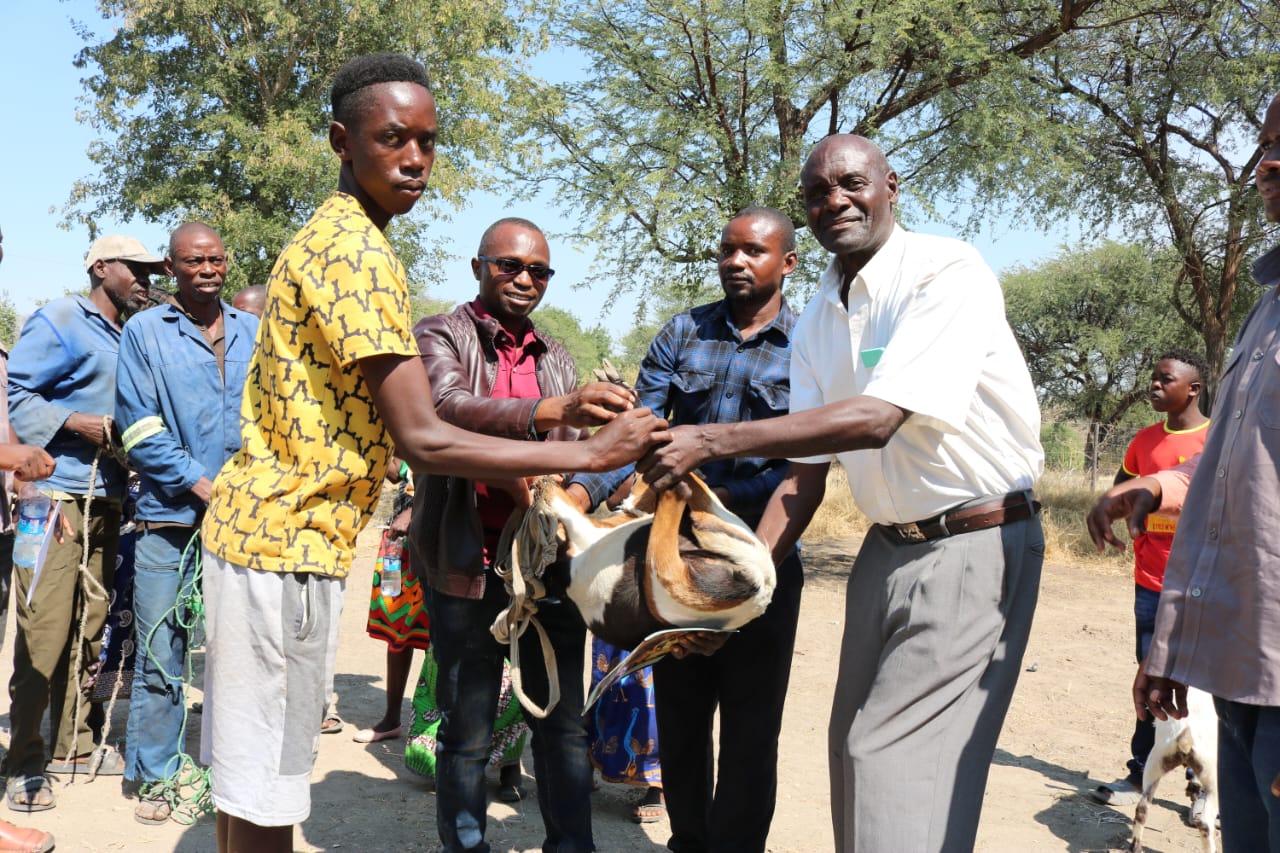SESHEKE COOP. GOAT MULTIPLICATION SUCCESS CHEERS GOVERNMENT

- By MULOONGO CHEELO
- Tags Stories Livestock
GOVERNMENT is elated by Maka Multipurpose Cooperative’s success in the Enhanced Smallholder Livestock Investment Programme (E-SLIP) goat pass on programme. During the recent pass on, 60 goats were passed on to 12 beneficiaries who received five goats each.
Speaking at the pass on event, Sesheke District Commissioner, Alex Namenda said that such programmes are a testament of what communities can achieve if they formed groups and worked together
Mr. Namenda said that programmes such as the goat multiplication programme based on the pass on model were the most practical way government was using to increase the livestock population.
“From 2018, 52 people have benefited from the E-SLIP pass on programme at this cooperative and today, we are adding another 12. This means that 320 goats have been passed on,” he said.
Mr. Namenda said that small livestock such as goats were key in unlocking rural poverty amid the negative effects of climate change, as goats are easy to manage.
In addition, the District Commissioner urged the beneficiaries to ensure that they take care of the goats by ensuring that they have raised goat structures and that they grow forage for the goats.
“In the 2022/2023 season, government through E-SLIP supported Sesheke livestock farmers with 620 Kgs of forage seed, which included Velvet beans, Stylo and Rose grass. Therefore, I urge you to take advantage of such programmes to improve the nutrition of your animals,” Mr. Namenda said.
Furthermore, Sesheke District Livestock and Fisheries Coordinator, Christopher Njenje urged those that had already shared goats to offer knowledge, best practices and skills they had learnt to new beneficiaries so that they do not struggle in raising the goats.
Meanwhile, 24-year-old Lungowe Mwananyambe who benefited from the E-SLIP pass on programme under Maka Multipurpose Cooperative in 2018 said that her life had changed from the time she received the goats.
“After passing on the obligatory five goats, I sold six goats whose proceeds I used to buy seed and some improved goat breeds. By 2022, I had sold 50 goats and I used the money to do various things. I have built a modern raised goat house with a wire fence around. I have also been buying home supplies such as food and household goods,” Ms. Mwanayambe said.
She currently has a breeding stock of 25 goats.
Another beneficiary, Gladys Pumulo Maunga noted that before receiving goats under E-SLIP, she used to get money from rainfall-based farming and sometimes her husband used to fish.
However, income from these ventures had been going down yearly due the low rainfall and the depleting fish population in the Zambezi River.
“Through E-SLIP, I have learnt how to grow fodder, I received five goats and I have since passed on to another beneficiary. To date, I have sold 30 goats at different times. The estimated aggregate value I gained from these sales is K10, 500,” she said.
Mrs. Maunga said that she used the money to buy school supplies for her children and other household items.
She said that this had improved the overall school performance of her children and that it had generally improved her livelihood.
In addition, Maka Multipurpose Cooperative Chairperson, Reuben Mwananyambe said that his cooperative had started engaging in bulking of goats for sale at Kasumbalesa Border.
“We have been given a bulking centre under the Pilot Programme for Climate Resilience and last October, we bulked, transported and sold 75 goats at Kasumbalesa Border. We have since started bulking another set of goats for sale,” he said.
The Eighth National Development Plan envisions an improvement in livestock production and productivity. Therefore, programmes like E-SLIP remain important in government’s quest to develop the country, especially, rural areas.
